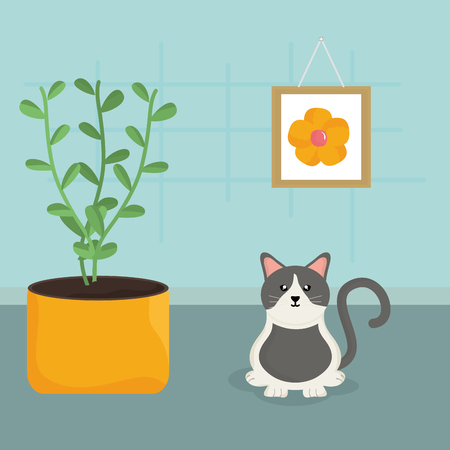Introduction to Cat Grooming in the UK
In British households, our feline companions are cherished members of the family, often enjoying pride of place on the sofa or a sunny windowsill. Yet, when it comes to their grooming needs, misconceptions abound—even amongst the most devoted cat lovers. In the UK, where our cats brave everything from rainy afternoons to brisk countryside winds, maintaining their coats and overall hygiene is more than just a matter of appearance; it’s essential for their well-being. British vets frequently encounter myths surrounding cat grooming that can lead to confusion or even neglect of proper care. From assumptions about self-grooming to misunderstandings around professional grooming services, these myths can have real consequences for our pets’ health and happiness. This article explores why understanding the truth about cat grooming is particularly important for British cat owners, taking into account our unique climate, living environments, and cultural approach to feline welfare.
2. Myth: Cats Groom Themselves Perfectly
It’s a common sight in British homes: cats meticulously licking their fur, seemingly the epitome of self-sufficiency. This has led many to believe that felines require no assistance with grooming. However, according to British vets, this belief doesn’t always hold true—especially for domestic cats living in our often centrally-heated, carpeted homes.
Why do people think cats don’t need help? The myth stems from observing cats’ natural grooming habits. They spend a significant portion of their day cleaning themselves, and it’s easy to assume this is all they need. Yet, grooming is more than just keeping fur tidy; it’s about maintaining skin health, preventing matting, and controlling parasites.
What British Vets Really Advise
UK veterinary professionals emphasise that while cats are generally good at self-grooming, there are limitations—particularly for long-haired breeds, older felines, or those carrying a bit of extra weight. Environmental factors also play a role: indoor cats can develop mats and hairballs if not regularly brushed.
Common Grooming Challenges Seen by British Vets
| Cat Type/Situation | Grooming Issue | Recommended Action |
|---|---|---|
| Long-haired breeds (e.g., Persians) | Matted fur, tangles | Daily brushing, regular vet checks |
| Elderly/obese cats | Missed spots (back/rear), greasy fur | Gentle combing, spot-cleaning as needed |
| Cats with arthritis or illness | Lack of grooming due to discomfort | Extra assistance, regular monitoring for skin issues |
| Outdoor cats | Burrs/twigs caught in fur, parasites like fleas/ticks | Frequent inspections, prompt removal of debris and pests |
| Indoor cats | Shed hair leading to hairballs and mats | Weekly brushing to reduce loose hair and prevent problems |
The Takeaway for Cat Owners Across the UK
No matter how fastidious your feline may seem, British vets agree: most cats benefit from a helping hand when it comes to grooming. Regular brushing isn’t just about keeping their coat pretty—it’s a chance to bond and monitor your cat’s overall health. Plus, it helps prevent more serious issues down the line. So next time you see your moggy at work with her tongue and paws, remember: even the best self-groomers sometimes need a bit of British backup.

3. Myth: Only Long-Haired Cats Need Grooming
It’s a common belief among many cat owners that only long-haired breeds require regular grooming, but this simply isn’t the case. British veterinary professionals are quick to point out that even our beloved short-haired moggies benefit immensely from routine brushing and care. According to vets across the UK, grooming is not just about keeping fur looking tidy; it plays a crucial role in your cat’s health and wellbeing, regardless of coat length.
Short-haired cats may seem lower maintenance, but they still shed hair and can develop mats or tangles, particularly around the neck and hindquarters. Regular brushing helps to remove loose fur and reduces the amount of hair swallowed during self-grooming, which in turn helps prevent hairballs—a common issue seen in both long- and short-haired cats by local vets.
More than just a beauty treatment, grooming offers a valuable opportunity for owners to check their cats for any lumps, bumps, or skin conditions that could otherwise go unnoticed. British vets emphasise how early detection of such issues can make all the difference in successful treatment. Plus, many cats come to enjoy the attention once they get used to it—it becomes a lovely bonding ritual between pet and owner.
In summary, no matter if your feline friend is a classic British Shorthair or a sleek domestic tabby, setting aside time for regular grooming sessions will help keep them healthy and happy. As UK veterinary professionals often remind us, good grooming habits are for every cat—not just those with long locks!
4. Myth: Human Products Are Fine for Cats
It’s a common misconception that human grooming products—such as shampoos, conditioners, or even wet wipes—are perfectly safe to use on our feline companions. However, British vets strongly advise against this practice, and for good reason. The skin of cats is notably more sensitive and has a different pH balance compared to human skin. Using household grooming products can result in irritation, allergic reactions, or even toxicity if your cat licks off any residue during self-grooming.
Why Do British Vets Recommend Specialised Cat Products?
- pH Balance: Cat-specific grooming products are formulated to match the natural acidity of feline skin, unlike most human products which are too harsh.
- Ingredients: Many household products contain fragrances, essential oils, or chemicals that are unsafe—or even toxic—for cats.
- Residue Risks: Cats groom themselves by licking their fur. Any leftover product could be ingested, leading to digestive upset or poisoning.
Safer Alternatives Readily Available in the UK
| Unsafe Human Product | Recommended Cat-Safe Alternative (UK) |
|---|---|
| Human Shampoo/Conditioner | Pet Head Cat Shampoo (available at Pets at Home) |
| Baby Wipes/Antibacterial Wipes | Pura Cat Wipes or Beaphar Cat Comfort Wipes (pet shops & online) |
| Talcum Powder/Deodorising Sprays | Johnson’s Veterinary Dry Foam Shampoo for Cats |
If your cat needs cleaning between baths, opt for unscented pet wipes approved by UK veterinary guidelines or dry shampoo formulas made specifically for cats. Always check with your local vet before introducing a new grooming product to ensure it’s safe and suitable for your cat’s unique needs. By using appropriate products, you’re not only keeping your feline friend clean but also safeguarding their health in line with British animal welfare standards.
5. Myth: Grooming Causes Stress and Should Be Avoided
It’s a common misconception that grooming is inherently stressful for cats, so it’s best left alone. However, British vets consistently highlight that with the right approach, grooming can actually become a soothing and enjoyable experience for both you and your feline companion. The secret lies in patience and a gentle, caring attitude—qualities we Brits pride ourselves on.
The Importance of Patience and Familiarity
Cats thrive on routine and familiarity. By introducing grooming sessions gradually and in a calm environment, your cat will start to associate these moments with comfort rather than anxiety. Begin with short sessions, using soft brushes suited to your cat’s coat type, and always reward good behaviour with gentle words or a favourite treat. This steady, patient approach mirrors the classic British way: never rushed, always considerate.
Building Trust Through Gentle Touch
Many UK vets recommend making grooming part of your everyday interactions. Start by simply stroking your cat in the areas they enjoy most, then slowly introduce the brush. If your cat shows signs of discomfort, pause and try again another day. Over time, this reinforces trust and helps them feel secure—much like a warm cuppa shared with a friend.
A Positive Routine for Lifelong Wellbeing
When done properly, grooming isn’t just about keeping fur tidy—it becomes an opportunity for bonding. Cats who are regularly and gently groomed tend to be more relaxed during veterinary visits and less likely to develop matted coats or skin issues. So rather than avoiding grooming out of fear of stress, embrace it as a chance to care for your pet in true British style: with thoughtfulness, respect, and plenty of affection.
6. British Vet-Recommended Grooming Tips
When it comes to keeping your feline friend in tip-top condition, British vets offer a wealth of advice tailored to our unique climate and lifestyle. Here are some tried-and-tested UK-specific grooming techniques and products that support your cat’s health and wellbeing, all straight from the experts.
Choose the Right Brush for Your Cat’s Coat
According to local vets, selecting the right grooming tool is essential. For our beloved British Shorthairs or domestic moggies, a soft-bristled brush is ideal for regular maintenance. For long-haired breeds, such as Maine Coons or Persians, a wide-toothed comb can help prevent tangles and mats, especially during the damp autumn months when fur tends to clump more easily.
Regular Checks for Fleas and Ticks
With our often-mild winters, parasites like fleas and ticks can be a year-round concern in the UK. Vets recommend incorporating a flea comb into your grooming routine at least once a week, focusing on areas around the neck and tail base. Spot-on treatments prescribed by your vet are also widely used here and should not be overlooked.
Bathe Only When Necessary
Unlike some other regions, British vets generally advise against frequent bathing unless absolutely necessary—such as after a muddy romp through the garden or if your cat has rolled in something unpleasant. When you do bathe your cat, use a gentle shampoo specifically formulated for felines; brands such as Johnson’s Veterinary or Animology are popular choices in UK pet shops.
Paw and Claw Care
The rainy British weather means cats may track mud and grit indoors. Wiping their paws with a damp cloth after outdoor adventures keeps them clean and prevents irritation. Claw trims should be done every few weeks using UK-approved clippers—ask your vet nurse for a demonstration if you’re unsure.
Keep Ears and Eyes Clean
Our vets remind us that regular checks of your cat’s ears and eyes can prevent issues before they start. Gently wipe away any discharge with a cotton pad moistened with cooled boiled water—never use cotton buds inside the ear canal.
Trusted Products Recommended by UK Vets
Many British veterinarians favour specific products for home grooming: Furminator brushes for de-shedding, Logic Oral Hygiene Gel for teeth, and Beaphar’s tear stain remover. Always buy from reputable UK pet retailers or your veterinary practice to ensure quality and safety.
By following these practical tips from local professionals, you’ll not only keep your cat looking lovely but also help them stay healthy and content—all while enjoying precious moments together in true British style.
7. Conclusion: Building a Healthy Routine for Your British Cat
To sum up, understanding the facts behind cat grooming is essential for every responsible pet owner in the UK. Throughout this article, we’ve debunked some common myths and set the record straight with guidance from trusted British vets. Regular grooming isn’t just about keeping your cat looking smart – it’s fundamental to their health and wellbeing. By brushing your cat often, checking their coat and skin, and maintaining good hygiene, you can spot early signs of problems and build a stronger bond with your feline friend. Remember, every cat is unique; factors like breed, age, and temperament can influence their grooming needs. For truly tailored advice, don’t hesitate to have a chat with your local vet or veterinary nurse – they know the quirks of British cats and can recommend the best routine for your pet. Prioritising regular grooming sets the foundation for a happy, healthy life together with your beloved companion.


